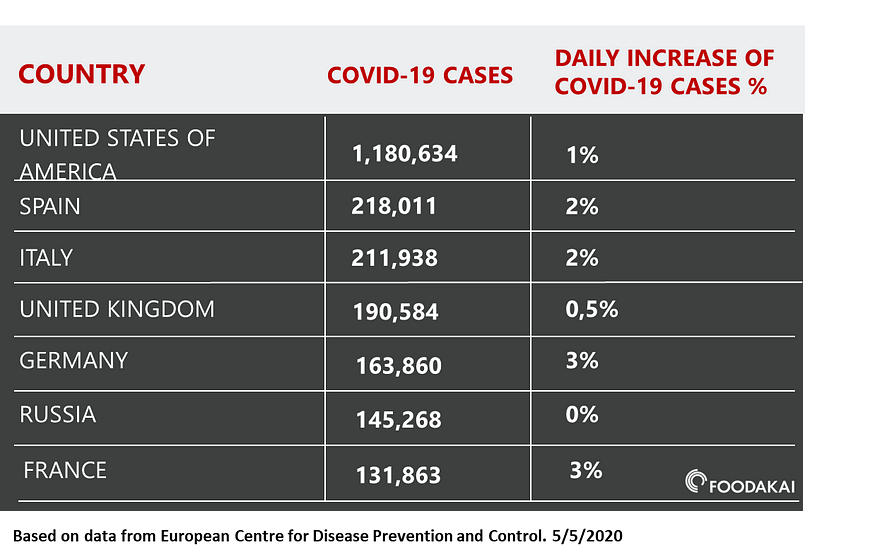As news headlines about the coronavirus (COVID-19) disease continue to increase, so has concern over its potential to affect employee welfare, disrupt global supply chains and slow business operations. With the majority of countries across the globe (209 countries as presented in the figure) affected by the COVID-19, the quality assurance and food safety professionals are working hard to ensure the continuity of their supply chain. Even more today, the protracted pandemic crisis has put a strain on the food supply chains, which is a complex web of interactions invloving farmers, agricultural inputs, processing plants, shipping, retailers and more. The shipping industry during the pandemic crisis is reporting slowdowns because of hurdles that exist on the ports and logistics disrupting with this way the food supply chains.

The visualization map demonstrates today’s most important food producing and exporting countries that have been affected by COVID-19 — with the increase of cases in these countries being exponential. So far, (as of 05/05/2020) the most affected countries by COVID-19 are Italy, Spain, the UK and the US. Based on the total cases and daily increase of cases, the most affected countries that play a key role in global food production are United States, Italy, Spain, United Kingdom, Germany, Russia and France (see table below).

The current landscape for demand, supply and transportation
On the one hand, there’s a high demand amongst consumers for both longer lasting food products — such as macaroni, flour and rice, and for fruits and vegetables with high content in vitamin C — such as oranges and lemons. On the other hand, there are restrictions limiting production and causing delays in the transportation of food products. Food production is highly affected as many plants are working in a safe mode and there is a lack of workers harvesting fruits and vegetables in the primary sector. Additionally, the transportation of food products is facing several problems including delays, limitation in space on airplanes and increased prices. These issues are creating food safety challenges across the industry.
Food safety challenges
Concerns about the quality and safety of the products: Buyers in food manufacturing and retail companies may have concerns about the quality of products imported from countries highly affected by COVID-19. To address concerns they may ask suppliers within these countries to provide better justification of the production process as well as requesting additional certificates. Providing such documentation is challenging for companies that produce products in these countries — due to restrictions applied at a national level in order to control the outbreak.
Food products availability is a major concern (Photo by ?? Claudio Schwarz | @purzlbaum on Unsplash)
Suppliers verification: today the most important tool for supplier verification is not available as on-site audits are not allowed due to travel restrictions. National authorities such as the FDA are already launching new guidelines on alternatives for supplier verification.
Availability of food products: Production at the farming, packaging and processing level is expected to dip which may impact the availability of food products in countries highly affected by COVID-19.
Italy is a major exporter of tomatoes and apples. Due to the restrictions associated with the control of COVID-19, the supply chain may experience delays in the transportation of tomatoes and apples as Italy is a major exporter. In addition to transportation issues, there are also problems arising due to Italian suppliers being unable to cover the demand. As a result, we may see a transition towards other countries both supplying and exporting these food products.
As Spain is both the top producer and exporter of fruits and vegetables in Europe — and one of the most highly affected countries. Restrictions to control the spread have been applied which may result in problems such as reduced production and delays in the transportation.
Countries such as Germany and France have experienced a sharp increase of COVID-19 cases. As these countries are major producers of products such as wheat and barley, vegetables and sugar, the global supply chain is anticipated to face problems in the availability of such products.
Delays in the food supply chain: While loading and unloading has continued to function in the major ports of the world, barge services have been delayed at a number of ports according to data collected and analysed by Marine Traffic. Furthermore, the major ports across the globe have now adopted a 14-day quarantine period for vessels arriving from, or transiting through, China. Such delays in transportation may result in long time storage that could affect the quality and safety of products — for example the development of toxins in cereals and nuts.
The 14-day quarantine period in ports can have implications on food availability (Photo by Andy Li on Unsplash)
New reality and TheFSM platform
The new landscape is not a temporary situation. The supply chain is set to be affected for several months, resulting in a new reality for the way food safety professionals perform risk estimation. This reality calls for remote supplier verification and risk estimation, virtual audits and extensive data available to support decision making. Solution to this bottleneck aims to bring our our innovative project “The Food Safety Market”, an EU Horizon project. Through the project an SME-powered industrial data platform will build. This platform foresees to boost the competitiveness of European food certification and establishing the remote auditing procedures and techniques not only at European level but also in a worldwide scale. This operational platform will also utilise state-of-the-art data technologies in order to provide not only information needed in no time but also, a deep hazard analysis, and supplier check and risk estimation that can all be set in a few minutes.
